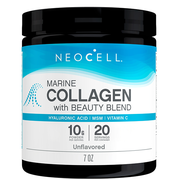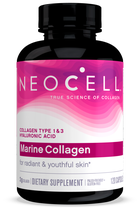FAQs
Collagen is the body’s most abundant protein that helps give structure to skin, hair, nails, bones and joints. While our bodies make collagen on their own, this natural production starts to slow starting in our 20s. That’s when getting additional collagen, whether through diet or a supplement, can help support collagen formation as we age.*
Marine collagen is sourced from fish, and it’s a great choice if you’re following a pescatarian diet or looking for non-bovine collagen. NeoCell Marine Collagen is made from hydrolyzed collagen from tilapia and/or carp.
Collagen is a naturally occurring protein, and the main structural component of our skin, hair, nails, joints and bones. It helps to maintain strength, elasticity and flexibility from head to toe. But over time, our body’s collagen stores get depleted, which can show common signs of aging.
Research shows that taking collagen and marine collagen supplements daily can support healthy collagen formation that in turn supports healthy skin, hair, nails and joints, so you can look and feel your best at every age.*
Collagen is found throughout the body, but it has one primary job: maintaining the structural integrity of your body to help keep you strong and flexible. Research suggests that taking hydrolyzed collagen and hydrolyzed marine collagen can help provide some of the building blocks your body needs to continue making collagen—and other important proteins like keratin—even as you get older.
When your body is able to keep producing collagen, that helps to support radiant, beautiful skin and healthy hair, nails and joints. Marine collagen is a go-to for those looking for pescatarian- and keto-friendly collagen.*
Because it’s derived from the skin and/or scales of fish, marine collagen is not vegetarian or vegan. But it is an alternative to bovine, or cow-sourced, collagen. Like our Super Collagen and other collagen powder supplements, NeoCell Marine Collagen is unflavored and dissolves easily into any hot or cold liquid.
Vegans and vegetarians can get similar benefits from plant-based collagen alternatives. NeoCell Beauty Builder, for example, supports healthy skin, hair and nails with baobab, bamboo silica, vitamin C, and 9 vegan amino acids.*
First things first, this isn’t an apples-to-apples comparison. “Marine” refers to the collagen’s source, where “peptides” refers to its form. Marine collagen is collagen sourced from fish, while collagen peptides are tiny bits of collagen that have been broken down by a process known as hydrolyzation. In this smaller form, collagen is easier for your body to absorb (and easier to dissolve in hot and cold beverages).
Most marine collagen supplements are hydrolyzed, and the label will either read “hydrolyzed marine collagen” or “marine collagen peptides.” Same goes for the majority of collagen supplements across the board. Whether they’re derived from marine, bovine or poultry sources, most are labeled either hydrolyzed collagen or collagen peptides. The terms are interchangeable.*
There’s no one-size-fits-all approach to taking collagen of any kind, but research suggests that consistency is key. A good amount for the average adult is 10 grams of hydrolyzed collagen daily, whether you’re taking bovine-based or marine collagen supplements.
Keep in mind that while it’s a good idea to try to get the nutrients your body needs through food sources, getting adequate collagen through diet alone can be tough. That’s because collagen—which comes from the skin, bones, tendons and ligaments of animals—isn’t readily found in most foods consumed in the Western diet.*
Most collagen capsules, powders and liquids are bovine-sourced from cow hides, bones and/or tendons. Marine collagen is made from the skin and/or scales of fish like tilapia, carp or cod.
While there’s no one best marine collagen supplement, try to find one that’s hydrolyzed or labeled “marine collagen peptides.” The two terms are interchangeable, and simply mean that the collagen has been broken down into smaller bits (or peptides). These smaller bits are easier for your body to absorb and dissolve fully in hot or cold liquids—making them a tasteless, odorless addition to coffee, tea, smoothies or soups.
We also suggest looking for a product that’s IGEN Non-GMO Tested.*
Though it’s usually made from tilapia, carp or cod, marine collagen doesn’t necessarily taste or smell fishy. This is because the fish oils—which is where the fishy odor and taste is most concentrated—are typically removed during the extraction process. And marine collagen that’s been hydrolyzed, or broken down into smaller bits, can be easily dissolved in hot and cold beverages and liquids without affecting the taste or smell.*
As the body’s most prevalent protein, collagen helps give structure to hair, skin, nails, bones and joints. The protein is made up of four amino acids: glycine, proline, hydroxyproline and arginine. All of the above play a role in helping to keep our body’s connective tissues, hair and skin as strong and healthy as possible.
That means getting an adequate amount of collagen provides our bodies with some of the building blocks we need to promote healthy hair (and skin, nails and joints).*
While the human body produces collagen, mainly in the connective tissue cells, it’s also found in the skin, bones and connective tissue of animals. Supplements use collagen from animal sources, which is then hydrolyzed or broken down into smaller, more easily absorbable bits.
Marine collagen is sourced from fish—typically the skin and/or scales of tilapia, carp or cod. Bovine collagen, on the other hand, is made from cow hides, bones and/or tendons. In diet preferences, it’s self-explanatory. If you’re a red meat-eater, you might choose bovine-sourced collagen. If you don’t eat red meat, but you do eat fish, that’s where marine collagen comes in. We recommend looking for a supplement that’s IGEN Non-GMO Tested.
Taking marine collagen for skin makes sense when you understand a little more about collagen’s role. Collagen is widely considered a skin superhero. The human body’s natural supply of collagen declines starting in your 20s, which can lead to common signs of aging. Taking a collagen supplement like marine collagen is an easy way to help promote collagen production throughout your body, which in turn supports radiant skin and healthy hair, nails and joints.*
Marine collagen is a pescatarian-friendly alternative to bovine-based collagen supplements. Research suggests that taking collagen peptides helps to promote your body’s own collagen production, which slows over time. Collagen is important because it’s found throughout our bodies. It’s the primary structural component of skin, hair, nails, joints and bones, helping to maintain strength, elasticity and flexibility from head to toe.
Incorporating a marine collagen supplement into your daily routine is a great way to support healthy skin, hair, nails and joints—so you can keep moving, looking and feeling your best as you age.*
No matter the source, collagen is a great addition to your supplement routine, particularly as you get older and your body’s natural collagen production declines. Like bovine collagen, marine collagen helps support healthy hair, skin, nails and joints.
The main reason some people prefer marine collagen vs. “regular” or bovine collagen comes down to dietary preference. For those following a pescatarian diet, marine collagen is a great option that offers the same head-to-toe, collagen production benefits.*








